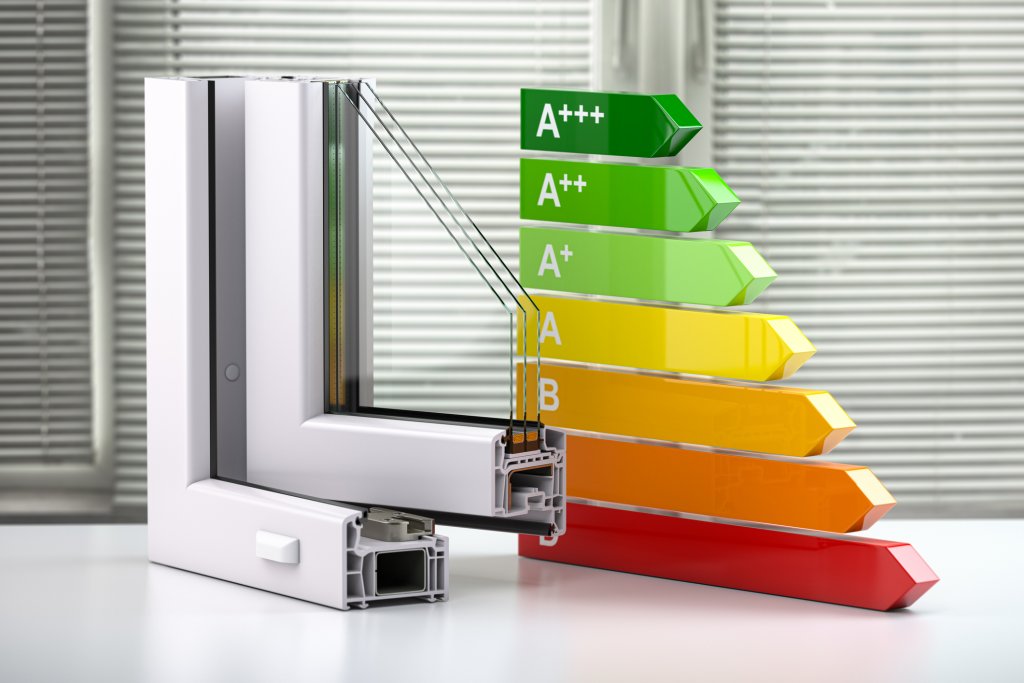Energy-efficient windows can save you up to £115 per year on your energy bill. They also provide a range of additional benefits, including insulating against external noise and reducing condensation build-up.
Finding energy-efficient windows may seem like an energy-draining task. Thankfully, all windows come with a thermal-efficiency rating to make insulating your home easier than ever. Learn more about energy ratings in this month’s article where we explain how the ratings work and your options when it comes to installing energy-efficient windows.
Thermal efficiency window ratings

The BFRC (British Fenestration Rating Council) gives windows a thermal efficiency rating from A++ to G, with A++ awarded to windows with extremely high levels of efficiency. For any window to be considered ‘energy saving’, it must be rated a C at the very least.
The rating system provides consumers with a quick and easy way to identify whether a window offers high or low energy efficiency. Though A++ is the highest rating, it is quite rare and only awarded to windows demonstrating outstanding thermal efficiency. Windows with an A rating may not be quite as efficient but still provide an excellent level of insulation. In fact, installing A-rated double glazing to windows in a single-glazed, semi-detached, gas-heated property can save as much as £95 per year on your energy bill.
Energy ratings are calculated by measuring three performance factors:
- Thermal transmittance (U value) — you may have heard of a U value as a way of measuring energy efficiency. The U value is perhaps the most important factor, as it measures how well your window retains heat. The less heat that is lost, the warmer your home will be. Therefore, the lower the U value, the more efficient the windows.
- Solar — This measures how much heat is captured by your window. Solar efficiency is represented as a number between 0-1, with a higher number indicating better solar efficiency.
- Air leakage — This measures how much air enters or escapes from your windows. The lower the L factor, the more airtight your window and therefore the less draughty it will be.
So what are the most energy-efficient windows?
The type of glass and the type of frame will affect the energy efficiency of a window.
When people think of energy-efficient windows, they often think of double glazing. This is a window with a layer of argon gas sandwiched between two panes of glass. Double glazing improves the thermal efficiency of single glazed windows, which only use a single pane of glass to retain heat. Double glazing is the norm for most homes these days, but there are additional options to increase energy efficiency even further.
Triple glazing adds a third pane of glass to increase a window’s energy efficiency at an additional cost.
Low emissivity windows feature a metal coating on a plastic film suspended between two panes of glass. These windows allow short-wave radiation from the sun into your home but don’t allow long-wave heat radiation to escape in the opposite direction. Low-E windows can be as much as 40% more efficient than traditional double-glazed windows.
If you reside in a single-glazed property and want to increase the energy efficiency of your home without breaking the bank, another option is to install secondary glazing. Secondary glazing involves adding another pane to existing single-glazed windows instead of removing the entire unit and replacing it with double glazing. Secondary glazing is a cheaper way to improve on single glazing but doesn’t quite provide as much energy efficiency as double glazing.
Does frame material affect energy efficiency?
It’s not just the type of glazing in a window that will affect its energy efficiency. The material of the frame is also an important factor.
uPVC, for example, is a more effective insulator than metals such as aluminium and will provide an extra layer of insulation in addition to the benefits of the glazing. Composite, wood and fibreglass frames are also effective insulators and should be preferred in favour of metal frames.
If you do have a metal frame on your window, one option to increase efficiency is to install a thermal break, which is a material incorporated into the frame to prevent conductive energy loss.
Bridgewater Glass is a leading glass and glazing expert. For over 75 years, we’ve been helping domestic and commercial customers to keep their property warmer with high-quality glass made bespoke to each window. We provide double glazing, secondary glazing, uPVC windows, commercial glazing and more. You can view our quality products at our showroom in Watford – we also deliver across St Albans and Hemel Hempstead.
Get your free quote today or contact our team for more information.
